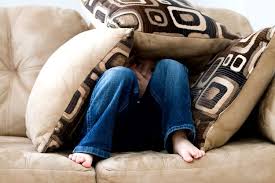
Virtual schooling, lockdowns and pandemic isolation have increased depression, anxiety, eating disorders, and alcohol and drug abuse among teens. The mental health of our children has become a significant stressor for parents. To say that these are difficult times for kids and teenagers is an understatement.
In a matter of days life changed last March when we went into lockdown. The sudden closure of schools left teenagers feeling overwhelmed and scared. Initially people thought the shutdown would last for less than a month. As we approach the one year anniversary of the lockdown (March 13, 2020) I have seen a dramatic decompensation in the mental health of teenagers. I have been counseling boys and girls in my South Jersey practice for over twenty-four years. Through the years I have met teenagers who have experienced loss, eating disorders, parental alienation, childhood abuse, and volatile home environments after divorce. While these issues continue to bring teens to therapy, the stress and uncertainty from COVID-19 has led to a significant decline in my patients’ mental health.
During sessions my patients between the ages of thirteen and twenty-one are reporting an increase in suicidal ideation, panic attacks, hopelessness and grief. Last week I spoke to three teenagers from different school districts who said told me things like, “I cannot even make it to class anymore.” They are sleeping through online learning and they are lacking motivation and drive to complete their schoolwork. One of my younger patients was rushed into see her pediatrician after she reported to me that she was thinking about suicide every day. At the beginning of the pandemic she struggling with mild depression and some eating disordered tendencies. During this last year she has been talking about her grief and fears about COVID. Her younger sister died of childhood cancer when she was eleven years old. The fear of getting COVID or of losing another family member to this dreadful virus has left her feeling unsafe and alone. She has a wonderful, supportive family unit. However, the daily reminders of people dying from COVID has brought the memory of her sister’s passing to the forefront. While she struggles with fears of getting sick after losing her sister to cancer, she says “but I can handle my fear much better when I am around my friends, cheerleading squad and teachers.” For this patient, a sense of normalcy and connection is crucial to her mental well-being.
Last week I was talking to another one of my teenage patients who has come out as transgender. For him, his primary support was being around his friends at school. He had the courage to come out to some close friends before the lockdown last year. Sadly, his home life is not tolerant of his choices, so he is forced to live in silence at home. He goes to online schooling, but he does not feel safe enough to talk about his internal struggles with his angry parents being in the next room of his house. At times he has felt so isolated and disconnected that he decided to start texting and emailing friends in the middle of the night. We have talked in our sessions about his sense of despair as the months go by. He is about to graduate from high school. At times he sobs in session when he talks about all the missed opportunities; such as, homecoming, the annual school musical and his daily check-ins with some of his favorite teachers.

Being a therapist during COVID-19 has opened my eyes to the challenges of being a parent, working from home and monitoring the well-being of our children. There are days when I am sitting in tele therapy sessions with my patients and my almost ten-year old is hanging out in the living room by himself. While he does not complain a lot about being away from his friends, I pick up on his sadness and loneliness. For the last six weeks my son’s school district has returned to school on a hybrid schedule. Elementary kids are going to school four days a week. Half the class goes in the morning and the other half of the class goes in the afternoons. Even though most of my son’s friends were placed in the afternoon cohort, I notice a dramatic difference in his mood when he plows through the front door after seeing his teacher and classmates on the days he has in person instruction.
Through the years I have counseled many teenagers and their families about how to cope with mental health issues. Some of the recommendations I have given are no longer suitable due to the school closures and lack of extra-curricular activities. As we move into what I am hoping are brighter days, there are strategies we can implement now to help manage the mental health of tweens and teens. Face to face contact and connection are more important now than ever. Suggesting and planning facetime meals or outdoor gatherings at least once a week is important. As school districts are navigating with transitioning back to full-time in person instruction parents can continue advocating for what works best in their family unit. Playing the role of advocate for your child and speaking up can be helpful if you feel like your school district is not giving mental health needs enough attention. Other tips to consider are:
- Give your children access to be heard. Suggest that they send emails to their local school boards if they feel like the current educational plan is not meeting their mental health well-being.
- Pay attention to their habits with food and sleep. If you notice your child is eating out of stress or staying up all night to avoid sleep say something. Consider reaching out to the school counselor if you feel like your child needs help with social and educational issues.
- Advise teenagers to limit or re-consider their relationship with social media. If they are turning to these sites because they are bored or are feeling insecure, try and re-direct them. Suggest they go to websites that focus on anxiety and social pressures. Search for online support groups that are moderated by therapists, social workers or school counselors.
- Be on the lookout for signs of self-harm, substance abuse or eating disorders.
- Encourage your teenagers to stay out of their bedrooms when they are not doing virtual learning or homework.
- Plan family workout routines or daily walks. Even just taking a ten minute walk with the family pet can make a difference in someone’s mood!
- Make space for your teenager to vent and talk about their frustration. Do not try and fix it. Rather, listen to them and validate their feelings. Remind them that life will not be like this forever.
- Normalize the need to seek counseling or asking for help. Remind your tweens and teens that it is healthy to ask for what he or she needs when they are going through a difficult time!

